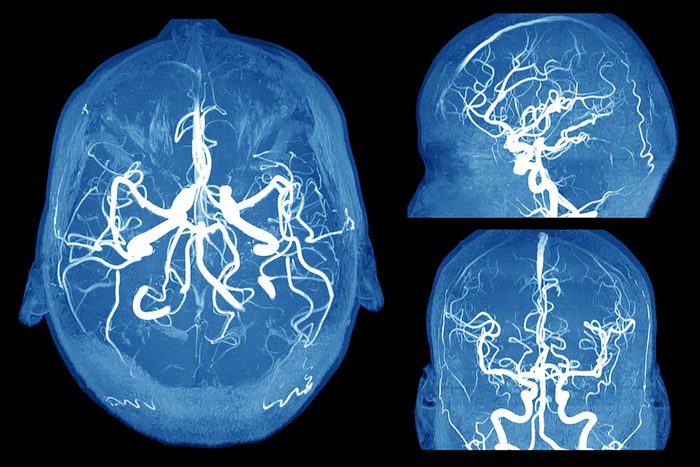
What exactly is a brain aneurysm?
A brain aneurysm is a bulge in a blood vessel in the brain, according to the Mayo Clinic. It’s been described as looking like a berry hanging from a stem. While most aneurysms don’t rupture or create health problems, those that do trigger bleeding into the brain result in a hemorrhagic stroke. Strokes can lead to serious consequences and are life-threatening. Make sure you’re aware of the easy-to-miss signs of a stroke.
If you’re experiencing any of the following symptoms, immediately call an ambulance or have someone take you to the ER—don’t drive yourself.

Sudden, severe headache
Headaches may often signal something serious. In an aneurysm, it can be really bad: “It’s often described as the worst headache of your life,” says Mark McLaughlin, MD, FACS, who practices neurological surgery at Princeton Brain and Spine. What’s happening? “The leakage of blood is irritating to the brain coverings, causing the pain.” It’s unlike regular headaches in that the pain comes on so abruptly, and it’s severe and intense.

Onset of double vision or droopy eyelid
“This can be caused by an enlarging aneurysm that is pushing on the nerve that moves your eye,” says Dr. McLaughlin. If you suddenly have eye problems—double vision, your eyelids start to droop—you should call 911 immediately. “This is not a ‘wait and see what happens’ situation,” says Dr. McLaughlin. These are the stroke symptoms in women that they’re likely to ignore.

Weakness or numbness on one side of the body or face
Another sign is when half your face or only one side of your body starts to go numb. “This comes from tiny clots leaking out of the aneurysm that are clogging small vessels going to important areas of the brain,” says Dr. McLaughlin. He explains that an aneurysm is like a blister with a thin wall that can pop and leak blood, wreaking havoc along the way. Here’s more proof you’re never too young to be concerned with brain health.

Gastrointestinal issues
“When you have a brain aneurysm, nausea or vomiting can take place,” says Ronald Benitez, MD, chief of endovascular neurosurgery, Atlantic Health System at Overlook Medical Center, Summit, New Jersey. “The bleeding and headache causes this.” So the headache starts first and then you may experience nausea, vomiting, or diarrhea.
Dr. Benitez says other common symptoms include: bleeding, dizziness, light sensitivity, and stiff neck. “These are all related to the bleeding or in some cases pressure in the head or the aneurysm pressing on related structures,” he explains. Make sure you know the best foods to eat for good brain health.

Risk factors
According to Dr. Benitez, risk factors that doctors and researchers believe contribute to the formation of brain aneurysms include:
- Smoking
- High blood pressure or hypertension
- Family history of brain aneurysms
- Age over 40
- Gender—women compared with men have an increased incidence of aneurysms at a ratio of 3:2
- Having other disorders: Ehlers-Danlos Syndrome, Polycystic Kidney Disease, Marfan Syndrome, and Fibromuscular Dysplasia (FMD)
- Drug use, particularly cocaine
- Infection
- Tumors
- Traumatic head injury

Treatment for brain aneurysm
“Some aneurysms that are not leaking can be watched,” says Dr. McLaughlin. “Others need to be packed off with minimally invasive surgery. Still, others need an open operation to clip off the weakness.”
He explains that treatment depends on severity. “Treatments for an unruptured aneurysm include medications to control blood pressure and procedures to prevent a future rupture,” says Dr. McLaughlin. “Emergency medical care is needed for a ruptured aneurysm.” Plus, don’t miss these 15 habits you never knew were aging your brain.
